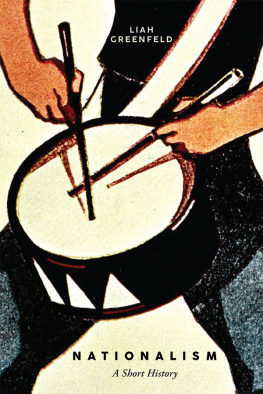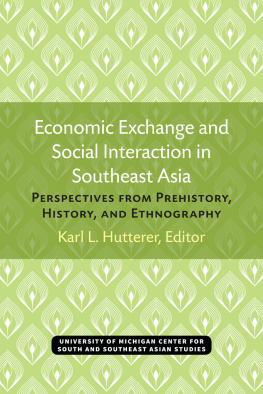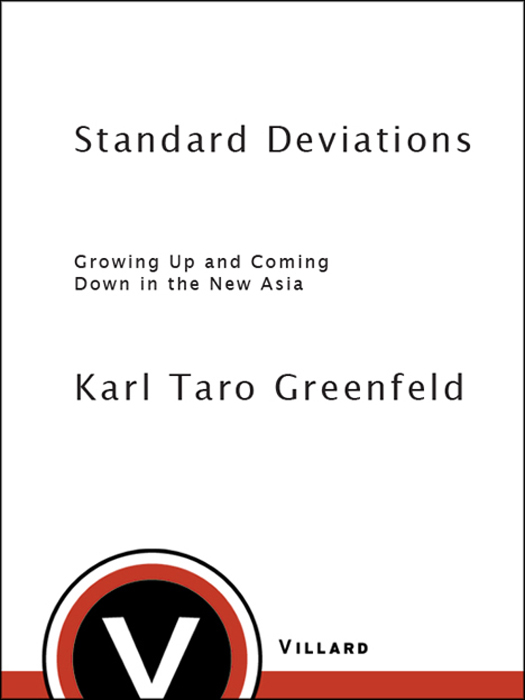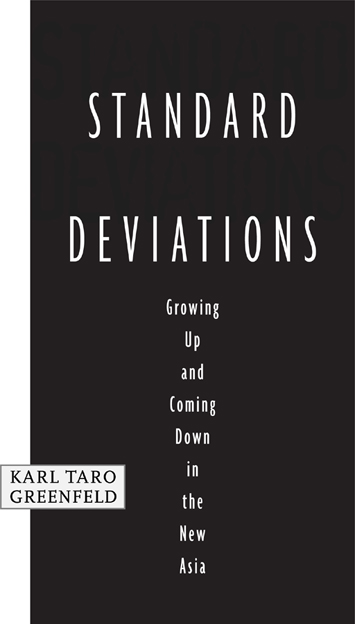Copyright 2002 by Karl Taro Greenfeld
All rights reserved under International and Pan-American Copyright Conventions. Published in the United States by Villard Books, an imprint of The Random House Publishing Group, a division of Random House, Inc., New York, and simultaneously in Canada by Random House of Canada Limited, Toronto.
V ILLARD B OOKS and V C IRCLED Design are registered trademarks of Random House, Inc.
This work was originally published in hardcover in 2002 by Villard Books, an imprint of The Random House Publishing Group, a division of Random House, Inc.
Portions of this book have appeared in various forms and at various times in Cond Nast Traveler, Salon.com, and Time. Certain identifying characteristics and chronologies have been altered for legal reasons and narrative coherence. Names have been changed to protect the guilty.
LIBRARY OF CONGRESS CATALOGING-IN-PUBLICATION DATA
Greenfeld, Karl Taro
Standard deviations: growing up and coming down in the new Asia/
Karl Taro Greenfeld.
p. cm.
eISBN: 978-1-58836-206-3
1. AsiaDescription and travel. 2. Greenfeld, Karl TaroJourneys
Asia. I. Title.
DS10.G69 2002
950.43092dc21 2001057511
Villard Books website address: www.villard.com
v3.1
ALSO BY
KARL TARO GREENFELD
Speed Tribes:
Days
and
Nights
with
Japans
Next
Generation
For Silke
CONTENTS
INTRODUCTION
T he winter is hot and damp but not as hot and damp as the rest of the year, and that is why hundreds of us are here on this island, in the Gulf of Siam, sweating in tiny bungalows waiting for the sun to go down and the moon to come up. There is a rumor of a party in honor of the full moon, and this is before all around the world the idea of parties in honor of the full moon become a tourist clichthe e-generations narcotic equivalent to visiting the Louvre or spending an afternoon at Epcot. But even though I have never before heard of full-moon parties, I am skeptical. A Canadian magazine writer is here, and he is chasing down the story of these parties, supposedly the Asian manifestation of the acid-house dance-music movement that is just now blowing over from Belgium and Holland to Manchester and New York. Alistair has long blond hair and is older than me, and he is working for a real magazine, albeit a Canadian one. He seems assured, and when he asks about what kind of music they will be playing, the farangs who have been here longer than us answer him and dont condescend to him the way they do when I try to talk to them.
It is already a bit of a disappointment to me that Ive come thousands of miles and put up with unsafe and questionable forms of transport only to find that these cool kids seem as cliquish as the popular kids in my high school cafeteria. They wear batik, sport these sorts of swirly tattoos, and whenever I try to find out what they are doing or where they are going they pointedly say that I ask too many questions. But I sincerely want to know: Who are they?
Where are they going? Which of these little shacks sells the best fresh fish? How do you wipe your ass without toilet paper? Can the guy who sells the mushroom omelets also get good Es, as he promises? I need these answers, and so I loiter on the fringes of these little bands of travelers, pestering them and making them progressively more annoyed.
Most of them are British, with a few Germans and Aussies and Canadians thrown in, and they are all of those things I want to be: confident, self-sustaining, knowledgeable, trendy, good-looking. My connection is this Canadian magazine writer; it is by his sufferance that I am allowed to stay on the outskirts of the grooviness, to find some trendy shadow. And it is from him that I learn you dont ask questions, you simply wait until the answers are manifest.
But I do probe Alistair for tips and secrets. To me, he seems vastly successful. Hes written for cool magazines in England, the U.S. and Canada.
Hes underwriting the cost of this trip with the story he will produce. How does one go about getting these sorts of assignments? Who do you have to know? Can I do it too?
I think Im a good writer, I tell him. Im not sure what it is I want to write: books, magazine articles, screenplays. I want to write, and try, everything. That is, after all, why I came out here.
I was twenty-three and I had set off for Asia to become a writer, intrigued by lurid tales of booms, busts, drugs, sex, violence, magic. There was a wicked sorcery in Asia, in the economic profligacy of the early nineties, in the way financiers and businessmen took a rapidly wiring and developing continent and looted billions, like a titanic parlor trick converting all that wealth into abandoned office complexes and half-completed shopping malls. There was sexual magic, the licentious cousin of that fiscal corruption, in the fleshpots where girls and boys stood behind glass partitions with numbers pinned to their G-strings; in the way you could pick up a fellow traveler in Bangkok or Manila and spend a few nights together before parting, maybe forever or maybe to run into each other again at a different guest house, on another island, in a strange new nightclub. Whatever defenses these girls may have carefully fostered in their native Stuttgarts or Vancouvers were easily breached by salvos of tropical heat and dope. And there was narcotic alchemy, in the illicit drugs so easily grown and refined in the arid highlands and fecund jungles and in the licit pills and powders dispensed by chemists in the squalorous coastal cities. I wanted it allthe money, the sex, the drugs. And to this day I believe that if I am honest with myself, despite all I have learned the hard way over the past decade, I would still want it all again, the fucking and the getting loaded and the scheming to get enough money to pay for that life.
A word about myself: I was born in Asiain Kobe, Japanof a Japanese mother and Jewish American father. As an Asian American brought up in California, I still looked to the Far East. It was the continent of my ancestors and the source of so many of the images that haunted me as I grew up: that naked girl running from napalm smoke and flame down a Vietnamese road; Indian yogis hanging stones from their penises; heads propped on stakes outside a raped and pillaged Nanking. But the fascination was with more than just the macabre and atrocious; I was transfixed by the continent of my birth for other, obvious reasons. Wasnt I lumped in census forms and demographic breakdowns with Indians, Thais and Chinese as Asian? Wouldnt my Amerasian features, my jet-black hair, my half-Asian eyes blend in with the majorities in such great, burgeoning nations? Never quite at home in America because of my mixed racial heritage, I liked to think that I would be more at home in Asia, that perhaps my mothers Japanese blood would allow me to pass as one of the masses as I had never really managed to in the West. (Or am I now just deluding myself, and it was always about fucking and getting loaded and scheming a way to make more money?)
I dont think so. Visiting the Far East as a child, I was always amazed at how well I fit in. This was during the seventies, when the Asia of economic boomtowns and upward spiraling stock markets was still a decade away. But already in Bangkok, Tokyo and Hong Kong, there was a creeping, gaudy neon decadence on display. I caught glimpses of it in Yakuza movies and smelled it in tear gas fumes in the aftermath of a Seoul riot. Among my first and clearest memories are Asias supercities: Tokyo, like a neon-lit beating heart; Kobe, a giant transistor radio split open and set by the sea; zirconia-bright Hong Kong crawling up the sides of Victoria Peak, matching precisely a childs concept of what a big city should look like. And everywhere there was an energy, a vibe that bespoke the fantastic human and intellectual resources that would soon be unleashed.











